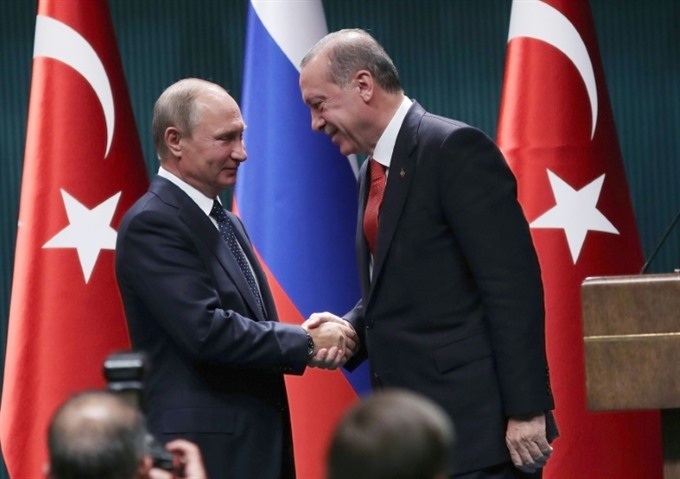 World
World

President Vladimir Putin and Turkish counterpart Recep Tayyip Erdogan on Thursday agreed to step efforts to bring peace to Syria, with the Russian leader declaring the right conditions now existed to end the over six-year civil war.
 |
| Russian President Vladimir Putin (L) and Turkish counterpart Recep Tayyip Erdogan agreed joint push to end Syria war. — AFP/VNA Photo |
ANKARA — President Vladimir Putin and Turkish counterpart Recep Tayyip Erdogan on Thursday agreed to step efforts to bring peace to Syria, with the Russian leader declaring the right conditions now existed to end the over six-year civil war.
After late night talks at Erdogan’s presidential palace in Ankara, Putin and Erdogan agreed to push for the creation of a “de-escalation” zone in Syria’s key northern province of Idlib, currently controlled by jihadists.
Despite being on opposite sides of the conflict, Russia and Turkey have been working together intensely since a 2016 reconciliation deal ended a crisis caused by the shooting down of a Russian war plane over Syria.
Moscow and Ankara have proposed at peace talks in the Kazakh capital Astana the creation of four de-escalation zones in Syria to be patrolled by military observers, but the one in Idlib is by far the most significant.
Erdogan said the pair agreed to “pursue more intensely” the implementation of a de-escalation zone in Idlib, in comments echoed by Putin.
Putin said the work to implement the agreements made at the Astana peace talks has “not been easy” but the sides had already “succeeded in having a positive result”.
“De-facto, the necessary conditions have been created for the end of the fratricidal war in Syria, the final defeat of terrorists and the return of Syrians to a peaceful life and their homes,” said Putin.
‘Deepen cooperation’
While parts of Syria, notably Aleppo province, have calmed considerably in the last months, Idlib remains the scene of heavy fighting.
According to the Britain-based Syrian Observatory for Human Rights, 135 civilians have been killed since September 19 in Russian and regime strikes in Idlib and Hama province, as well as 168 jihadists and rebels.
Russia and Turkey would work “with the aim of deepening the coordination of our joint activity to solve the Syria crisis,” Putin added.
Russia, along with Iran, is the key backer of President Bashar al-Assad and Moscow’s military intervention inside Syria is widely seen as tipping the balance in the conflict. Turkey, however, has backed the rebels seeking Assad’s ouster.
Although Turkey’s policy is officially unchanged, Ankara has notably cooled its rhetoric against the Damascus regime since its cooperation with Russia began to heat up.
Putin and Erdogan also hailed improving economic bilateral cooperation, with Russian tourists returning to Turkey and the two countries working on a Black Sea gas pipeline.
Turkey, a NATO member, has also signed a deal reportedly worth $2 billion (1.7 billion euros) to buy S-400 air defence systems from Russia, a move that has shocked its allies in the alliance.
In contrast to the poisonous personal attacks that followed the November 2015 shooting down of a Russian plane by Turkish forces, Erdogan repeatedly referred to the Kremlin chief as “my dear friend Putin”. — AFP




